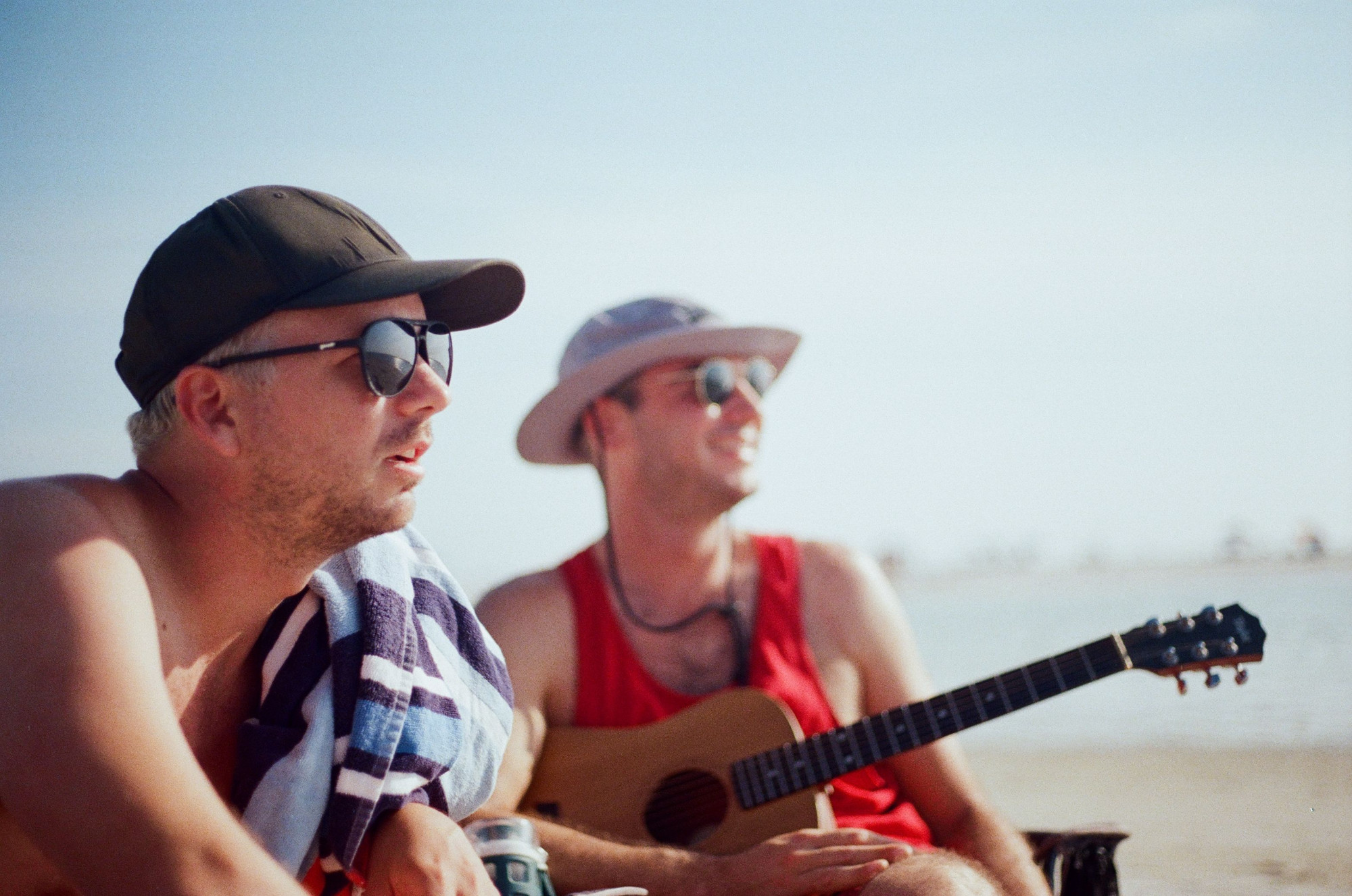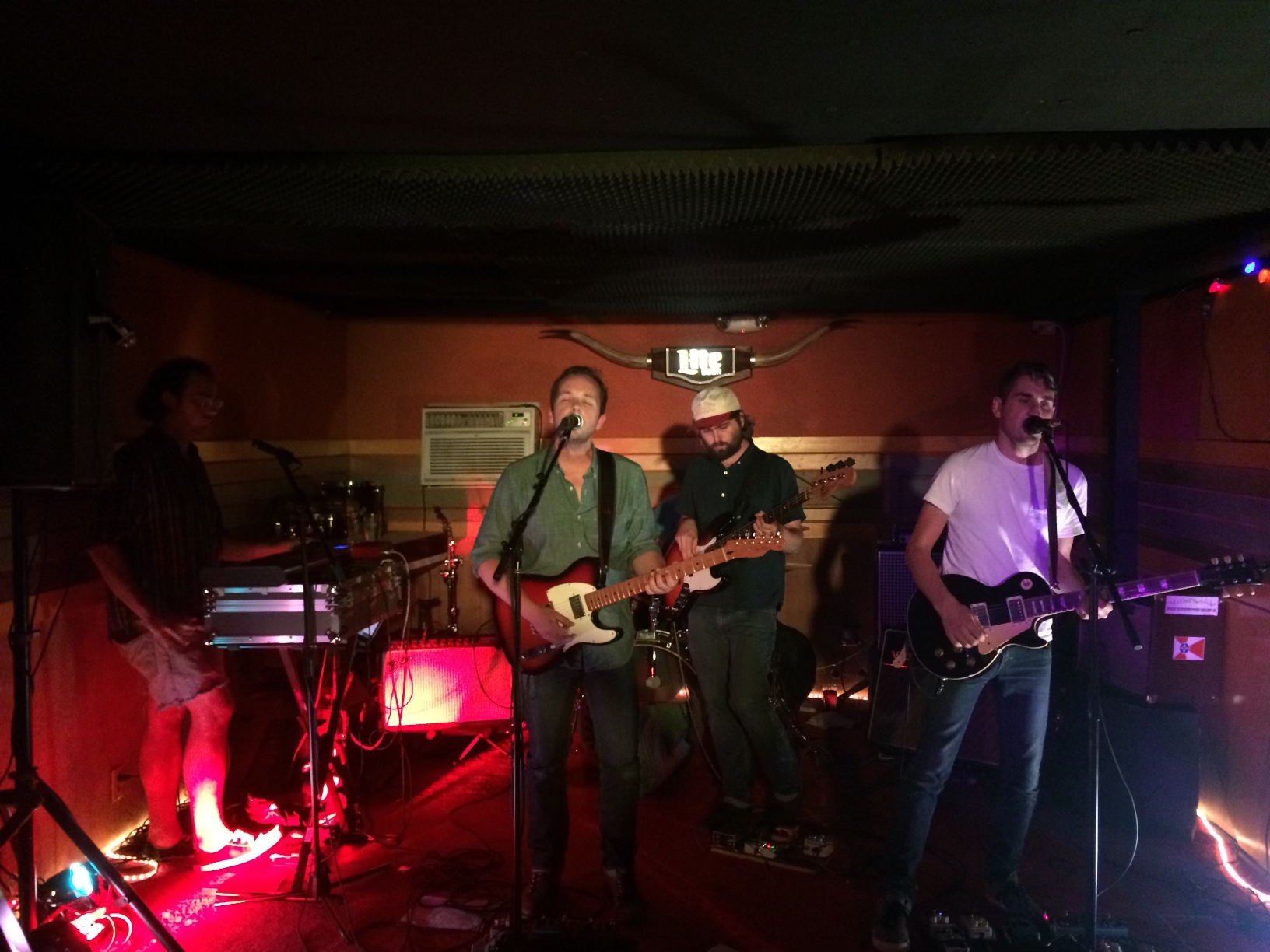Collaborating from Anywhere
How two Southern artists create films over time and space
By Gresham Cash

Photo of Ethan Payne and the author by Jodi Cash
About fifteen years ago in Athens, Georgia, I jealously watched as Ethan Payne and his brother entertained our friends with their music. Ethan had bands: first The Cubs then Easter Island. To me, their music was too emotional, overzealous at times. But we were young, and I was envious. I was still jamming and had not yet found the shared trust necessary to really collaborate on a project.
Five years later, we were shape-shifting church music. I was leading an intensely creative group of hungover musicians at an Athens church. We were digging into what a sixth-century melody might feel like to a variable combo of tortured millennials, depressed Gen Xers, and optimistic Boomers. We were experiencing the essence of multigenerational tastes and variable belief systems as they collided in music. We were collaborating.
Around that time, Ethan still had his shoegazey, post-rock band, Easter Island, and I had my grungy, alt-rock band, Oak House. His bass player recorded my band’s first record. Our bands began touring together. Ethan took photos of my band on tour while I played synthesizers with his. Our art, our friendships, and our community were developing.
Eventually, Ethan moved to Atlanta, where he was making short films and working in the booming entertainment industry. Athens stayed stubbornly college-aged, and my wife and I realized we had outgrown it and followed shortly thereafter in search of our next artistic step. I was still in some bands, but I longed for the haunting, cinematic music we’d created in church services together, something that established mood and conveyed meaning.
In that up-and-coming Atlanta, I took any variation of temporary work to remain available for music. I painted houses and brewed kombucha. I worked at farmers' markets and did some freelance writing. So when Ethan asked me to score a film, I was elated. Again, I could focus on melodic purity, music with intention. I could bring in the techniques I was cultivating as a writer—themes, motifs, narrative cohesion.
While many of his contemporaries don’t pay for original music, Ethan, I believe, wanted something special, dare I say, artisanal. Rather than search a music bed for moody blues, he’d ask me if I had time to write a score. I’d drop the forks I was polishing at a restaurant or neglect the bottles passing before me on a conveyor belt at some Atlanta brewery and reply, “Absolutely.”
There’s something special about Ethan. Hell, that’s why my album, Director E Vol. 1, bears his name and face. I’ve worked with few other collaborators who offer such creative trust.
As artists, aesthetics is something that we sometimes bare proudly, and sometimes bashfully. Ethan and I had respectively been honing our own musical aesthetics, channeling influences and preferences into something we could stand behind. But often, collaboration brings that under question. I felt that I knew what would make Ethan excited, what would make him nervous. And so, on our first film together I chose to focus on the droning tones that we’d come to love using with our troupe of Athens musicians.
On our first film we made together, a profile of Athens folk artist Chris Hubbard, I opted to remain subtle in the name of collaborative solidarity. I chose to sink into Hubbard’s otherworldly, penetrating “Heaven and Hell”—a Southern gothic vibe I’d developed that complemented his own.
Once I’d felt like I’d garnered Ethan’s trust, we started to expand our films’ moods. Some pieces were arty and weird. Others drone-y and textured. But when I really thought about writing themes, motifs that’d stick, I needed Ethan to say, “This is for Oxford American.” I was flattered by the opportunity to work on something that would be published there, or, here.
I’m an Athens native. I’m a writer. My wife’s a writer. Most of the porch-drinkers we were hanging out with had a copy of the Oxford American somewhere in their house. So, when Director E gave me a film for this familiar publication, I was ready. I knew the mood, and I understood the purpose. These short films were meant to celebrate colorful subjects: an artist, town, movement, or bowl of soup. So, I reduced my own soup to its purest form.
When Ethan wants to honor a Southern writer’s family, I lean into this notion. In “Soup John T,” composed and recorded for a short film about John T Edge's mother's catfish stew, there’s distance, nostalgia, and the slightest tinge of Southern hymnology. There’s such gentle meandering in the childlike melody of the B-section. But beneath it all was a story.
My technique for scoring usually begins with knowing the gist of the story, but then being led by the imagery and the faces before me. I highlight changes in the narrative and often follow the film more than musical logic. At times, this leads to irregularly structured compositions. But the subject’s story prevails.
I believe that it’s nearly impossible to comment on a place without having personally experienced it. So, when Ethan sends me a film, I’m factoring in what he would like to hear; I’m thinking about the subject, the narrative flow, the expected tone. But there’s a certain potency that comes from writing a piece of music based on a place for which one harbors their own little history.
In many of these Southern-based films, I’ve been multiple times to their location. Even if I’m not personally on a shoot with Ethan, I still know what thumbing books in an Oxford bookstore feels like. And for the last decade, nothing has imbued me with confidence to comment on any one place in America more than touring with a band.
If Ethan has been welcomed into a home in one Southern town, I have slept in a motel with three snoring men in that same town. And so, our collaboration unearths dynamic points of view. After playing frequently at The Nick in Birmingham, I had a good idea of what bars in that fine Alabama city really felt like. So, for a film about The Atomic Lounge in Birmingham, I wrote a rock song. Dirty guitar solo themes, punchy backbeat, soulful singing.
One unnerving element of collaboration is waiting to know if you’ve done something egregious enough to rattle your fellow collaborators’ artistic sensibilities. Sharing “Atomic” was one such moment. Although I believed that I’d composed a freaky, jazz-rock score that felt emblematic of an abstract costume bar, I was anxious when I sent the score to Ethan. Soon after, I received his affirmation.
Collaboration challenges us. It makes us conscientious in a sometimes-vain occupation. But what about when we stretch the limits and we begin to see our homeland, our region, our people from afar?

Photo of Easter Island by Jodi Cash
In January 2020, my wife, Jodi Cash, and I moved to Europe. Our plan was to edit our first feature-length documentary, The Green Flash, a movie about Steve Lamb and a group of adventurous smugglers who were busted with nine tons of pot off the northwest coast of Florida in 1973. We’d been making the film with Ethan since 2017, and I was also scoring it. But then, as history goes, we got locked down in Barcelona. And so we stayed for a while.
Since moving to Barcelona, I’ve made a psychedelic cumbia score with Mexico City guitarist Daniel Castro for a Southern Foodways Alliance film, The Silencing of the Lamb: A Barbacoa Story. Daniel and I also collaborated on other pieces for The Green Flash. In one big moment of the documentary, an icy female vocalist breaks through and sets a tone otherwise unfelt in the film. That voice is the multidimensional talent Denise Cianfaga. We met at a local jazz club in Barcelona, and upon hearing her play, I began to imagine a score with trumpet as its star. And so, a few weeks after that, Ethan sent me a film for the Oxford American about Tennessee pitmaster, Helen Turner. I asked Denise to send me a voice memo of a short melodic phrase, without explaining why. Shortly thereafter, we met up to record the soul groove on Director E, “Helen.”
A prominent joy of international collaboration is seeing how the South has touched musicians from all over the world. Whether it’s Daniel’s blues guitar licks in “Barbacoa de Cordero” or Argentinian producer Tomas Aristimuño telling me his favorite stories of the Delta Blues or my Greek buddy, Vangelis, arguing about James Brown’s birthplace—while far from home, I witness the importance of Southern music in a new way.
When I put Ethan’s cut for “Helen” on the screen, I’ll never forget Denise’s face. She stared in awe. It was almost like seeing the eponymous pitmaster enveloped in smoke was a mystifying revelation to a young woman from Buenos Aires. She teared up. And I’m not even sure she caught the irony that Helen had just said on-screen, “I know you cryin’ already.”
Living abroad, alienation comes standard issue. But when I listen to Helen’s rhythmic speaking voice or John T’s musings, I feel a deep connection to a familiar place. In Barcelona, I often feel like an evangelist for Southern art. “Y’all don’t know [insert Lonnie Holley, Deerhunter, Eudora Welty, Neutral Milk Hotel, Todd Murphy, Flannery O’Connor, Blind Willie McTell, Lil Wayne]?”
And that’s a gift of the modern era. Even though I have a band in Barcelona with two Catalans, a Venezuelan, and a Mexican musician, it doesn’t mean that I stop collaborating with folks in Athens or Atlanta.
Film scoring augments all of these delicate collaborations to new levels. What other medium simultaneously showcases storytellers, painters, graphic designers, photographers, ethnographers, musicians, and directors?
Director E Vol. 1 is just a small glimpse of how two Southern artists have the pleasure of participating in this vibrant collaborative realm—despite whether they look out their window and see palm trees or a long, dark line of loblolly pines.


